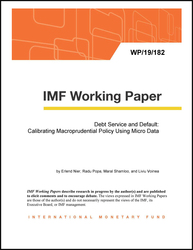
Debt Service and Default: Calibrating Macroprudential Policy Using Micro Data
We provide empirical evidence to support the calibration of a limit on household indebtedness levels, in the form of a cap on the debt-service-to-income (DSTI) ratio, in order to reduce the probability of borrower defaults in Romania. The analysis establishes two findings that are new to the literature. First, we show that the relationship between DSTI and probability of default is non-linear, with probability of default responding to increases in DSTI only after a certain threshold. Second, we establish that consumer loan defaults occur at lower levels of DSTI compared to mortgages. Our results support the recent regulation adopted by the National Bank of Romania, limiting the household DSTI at origination to 40 percent for new mortgages and consumer loans. Our counterfactual analysis indicates that had the limit been in place for all the loans in our sample, the probability of default (PD) would have been lower by 23 percent.
Publication date: August 2019
ISBN: 9781513509099
$18.00
Add to Cart by clicking price of the language and format you'd like to purchase
Available Languages and Formats
| English |
Prices in red indicate formats that are not yet available but are forthcoming.
Topics covered in this book
This title contains information about the following subjects.
Click on a subject if you would like to see other titles with the same subjects.
Macroprudential policy , Household credit , Romania , WP , consumer loan , borrower , NBR , PDs , mortgage loan
Summary
Copyright © 2010 - 2026
Powered by:
AIDC



